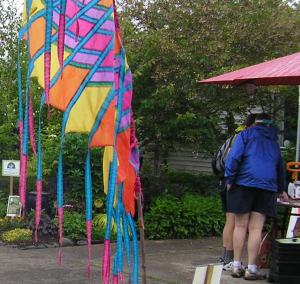Social Ecology
By Madronna Holden
Note: this essay appears in Green Politics, An A to Z Guide, ed. Dustin R. Mulvaney ed. (Sage Publications) and is copyright by Madronna Holden and Sage Publications.
Overview
Social ecology stresses the link between the domination of humans and the domination of nature, envisioning the creation of a non-hierarchical society as the solution to both contemporary ecological and social crises. Social ecology’s ideal society mirrors the integrative and communitarian order of natural ecology–characterized by dynamic unity in diversity. For social ecology, theory and activism are inevitably linked, as expressed in the programs of the Social Ecology Institute.
Social Domination and the Domination of Nature
Social ecology, as developed by Murray Bookchin, has as its central premise the idea that the domination of other humans occurs in concert with the human domination of natural systems. Both stem from hierarchical social arrangements that set men over women, rich over poor, race over race, humans over nature, and mind over matter. In such stratified societies, ideologies of objectification and instrumentalization develop in concert with a market system that prices everything– including human and natural life. Domination alienates humans from their true nature and potential for life in community, as well as from their essential freedom.
Technology flowing from capitalism (the supreme example of a dominating system) produces the toxic results laid out in Our Synthetic Environment, which Bookchin published a few months before Rachel Carson’s Silent Spring. In 1964 Bookchin predicted the greenhouse effect in his analysis of capitalism’s “grow or die” imperative that turns water and airways into “sewers”.
Social Ecology’s Theoretical Stance
Social ecology’s method is that of an “integrative science”, consciously bridging ideas rather than ranking and separating them in the manner of a hierarchical paradigm. Thus Bookchin conceives of social ecology as a science in dynamic interaction with imagination, a rational search for truth in dynamic interaction with concrete history, and an evolving theory in dynamic interaction with activism.
The aspect of dynamism here is a key one. Both ecologically sound social systems and the systems of thought that nurture them must continually evolve through dialogue and criticism, reflecting the dynamism of living systems rather than the stasis of final answers and stagnant institutions produced under paradigms of domination and control.
Social ecology’s central integration is its joining of social critique with an ecological model, thus giving ecology a “revolutionary edge”, and socialism a focus on the major contradiction of our time: that between capitalism and natural systems. In combining socialist with ecological perspectives, it also differs from each of these. Though social ecology concurs with Marx’s standard, “from each according to their ability, and to each according to their need”, it broadens the socialist focus on class oppression to encompass the oppression flowing from all hierarchical arrangements. It specifically rejects the instrumentalization of nature expressed in the socialist analysis of human labor as adding primary value to natural resources. It emphasizes not only the ways that humans work on nature, but the ways that nature works on humans.
Further, Bookchin stresses the distinction between social ecology and any environmentalism caught up in emotion and lacking rigorous assessment of the historical roots of ecological crises.
Social Ecology’s Utopian Alternative
According to social ecology, the only way to counter the intertwined social and ecological crises of our day is to abolish all hierarchy. This is both necessary and intentionally utopian. As Bookchin puts it, those who cannot imagine the impossible will have to live with the unthinkable.
But social ecology also insists that its vision is realistic—since it is grounded in both nature and history. In nature, the ecological order expresses mutualism and reciprocity, as illustrated by the circulation of food through ecological systems. Here no species can properly be considered higher or lower in that they all feed and are fed by others. In parallel fashion, natural evolution creates both increasing systemic complexity and potential freedom though its proliferation of particulars in the ordering of unity in diversity. Thus nature “on its own terms” (rather than a transcendent being or principle) provides the model of communitarian ethics necessary to an ecologically sound and just society.
In turn, Bookchin notes humans lived in a state of harmony with nature in the Neolithic period, in non-stratified “organic societies”. According to his analysis, however, equality and freedom were so naturally embedded in these societies that their members never consciously chose them. Here Bookchin locates the justification for historical evolution away from such organic societies to the state societies of today. He stipulates that human freedom and equality had to be lost in order to be understood as concepts to value and protect. Thus the “dialectic of freedom” is historically intertwined with the “dialectic of domination”—leading to the possibility of consciously choosing freedom and justice today. If humans fail to choose these, however, hierarchical capitalism will continue to move toward both totalitarianism and the destruction of ecological systems.
Though it is grounded in natural and historical example, social ecology’s ideal society must be consciously designed, not merely inherited from peeling away the destructive detritus of social institutions, as the anarchists Bookchin broke with later in his life believed. Rationality must guide the choice of how and when to act in creating such a society. In this context, critical thinking and education are essential forms of activism.
Modern science has an essential part to play in social ecology’s goals. Though capitalism currently misuses technology, the scientific knowledge that produces it has brought humans to a place in history where “almost anything is possible”. Appropriate technology can release human imagination as it alleviates the need for physical drudgery and moves societies beyond the scarcity that creates competition. Thus social ecology’s sustainable society is not one of depravation—but one rich in quality of life and occasions for expressing creativity. In making choices that actualize human potential by implementing such a society, Bookchin posits that human nature (“second nature”) expands the potential of the “first (ecological) nature” in which it is inevitably embedded.
Social ecology also avoids the “indulgent individualism” of both anarchy and modern consumerism. By contrast, it proposes a communitarian model of interdependent individuals living in small scale communities, confederated into a network of participatory democracies in which all those affected by decisions help make them. In this scenario, leadership and responsibility voluntarily circulate among different individuals.
This network of direct democracies is grounded in “ethical economics” geared to the well-being and sustainability of ecological systems and human life rather than amassing wealth for a few.
The Social Ecology Institute
Social ecology’s integration of theory and action is expressed in the Social Ecology Institute Bookchin co-founded in 1974. The SEI, affiliated with various colleges during its career, has sponsored degrees, conferences and projects focusing on direct democracy, ethical economics, resistance to biotechnology and nuclear technologies and the development of alternative technologies, permaculture, the shaping of the US Greens, ecofeminism, and support for Native American self-determination.
By Madronna Holden
For further reading:
Bookchin, Murray. The Ecology of Freedom. Palo Alto, California, Cheshire Books, 1982.
Bookchin, Murray. Post Scarcity Anarchism. Montreal: Black Rose Books, 1986.
Bookchin, Murray, “Reflections, An Overview of the Roots of Social Ecology”, Harbinger 3:1
(2003).
Bookchin, Murray, “The Communalist Project”, Harbinger 3:1. (2003)
Staudenmeier, Peter. “Economics in Social-Ecological Society”, Harbinger 3: 1. (2003)
Tokar, Brian. “Social Ecology and Social Movements”, Harbinger 3:1 (2003).







































I think we may be better off without a hierarchy. If we could all eliminate this perhaps we could work together to help achieve the unknown. Maybe we could better ourselves, our society, and our planet in general. So, if we eliminate the hierarchical political and social systems, I don’t think that we would have as much problems as we do today. What if we merged everything?
I agree that hierarchies stop us from working together–and sometimes are so busy preserving themselves that they get in the way of knowledge and action altogether. There comes a time when certain social structures should be evaluated as to whether they really work or not–and only kept accordingly. Thanks for the thoughtful comment, Jennifer.
I do not see how abolishing ALL hierarchy is realistic, or natural for that matter. In almost every culture of man and animal there is some type of hierarchy. From the queen bee to the Chief or shaman of a tribe, in nature there seems to be a status quo where some are held to a higher standard than that of the others. At the same time I can understand the importance of having a perspective of seeing all living beings as equals and treating them as such. While reading about the Neolithic period and how” freedom and equality had to be lost in order to be understood as concepts to value and protect,” I cannot help but think about our society today and how we have over exhausted our natural resources. What I mean by that is there seems to have been a belief that was developed somewhere along the line that there is an endless supply of what the earth haves to give us. And for some people, value and appreciation has only been given once they have seen the loss and destruction, and unfortunately there is a large population that is still living blindly. This reminds me of the saying you do not know what you have until it is gone.
Hi Angela, there are societies whose members would disagree with you about hierarchies– who are very, very careful not to establish them. The queen bee actually does not have it so good–nor does the shaman, since both are so much at the service of their societies. Be careful not to confused hierarchy with specialization. Many traditional Northwesterners went on spirit quests which determined what they would be best at in their lives, but that did not mean that they had authority over others– and certainly not in all aspects of tribal life. That is, a good hunter might lead a hunt, but his or her authority would dissolve in other situations. Among the Winnebago (midwest tribe) , for instance, anyone with temporary authority had to make careful amends to anyone s/he asked to do anything the latter did not initiate. And you may be interested to know that the “chiefs” in Western Washington and Oregon were created by the US government so as to make tribes easier to deal with. Isaac Stevens gave “chief’s papers” to those he chose to represent native peoples at treaty proceedings– you can still view some of these in the Washington State Library. I could write a hundred pages of examples, but my main point is this: be careful not to generalize from our cultural beliefs and practices to all cultures (and species). You are basing your response on stereotypes here that need further consideration. Indeed (see my “indigenous peoples”) the vast number of human cultures have been consciously egalitarian in nature: again, this does not mean that they do not recognize personal differences, but that those personal differences do not become the means for authority over others.
And I do want to thank you for your comment. These are important issues to air.
This conversation has me considering the role of leaders in hierarchies where authority is established. It seems that even in this case, leaders are at the service of their societies. Does it seem right to assume that more advanced levels of a hierarchy simply equate to being at the service of more people? Or am I making too close of a connection between authority and leadership? I suppose I’m really wondering if the negative impacts of hierarchies are inherent in the practice, or if they are due to abuse of authority.
Here is something to ponder with respect to your thoughtful question: the most thorough hierarchies are totalitarian societies–and I don’t think Hitler or certain military juntas exist in the service of the people. Indeed, I think they work (or worked) very hard to make sure that people served them through intimidation and abuse.
That does not mean that all leadership, of course, is abusive. But the more rigid it is the more it seems susceptible to abuse.
I think that the idea behind a society that has done away with all hierarchy is a lofty goal that we could/should strive to move towards. However, I do not think that the concept could evolve completely towards a utopia. Capitalism is so ingrained in our society that to abolish it completely would leave chaos (sadly). I think we have been so conditioned to function in a structured system that to live in one that is not structured in a capitalistic fashion, people would just be lost. Even with moving towards a slow transition to this type of thinking and living, I think it would take longer to get to the utopian standard of living that we would have already exhausted our ecological resources.
That is not to say that we shouldn’t head the ideas presented and find a way to incorporate them into our already existing society, which I think that is where we are heading now. People are beginning to grow tired of the bureaucracy of government and businesses and the lack of compassion many of these institutions display, in regards not only to the environment but also to society as a whole. They have forgotten that they would not be where they are if it were not for all the people who support them either by voters or purchasing power.
Recently an economist named David Korten spoke at the U of O, and made that point that what we have is a seriously perverted form of capitalism according to Adam Smith, the father of the idea, who stated that is order for the free market to work, there must be a reasonably equal distribution of wealth because market “buyers” and corporate power must be seriously limited and no corporations should be allowed whose main purpose is not service to the community at large.
I like Paolo Lugari’s statement about utopia at Gaviotas: he did not want to create one, since it literally mean a-topia– “nowhere”; he wants a “topia”.
And non-hierchical societies have existed in the past; in some ways that may be the only way to go for our future; at least we need to do something about the radical disparity of wealth and power in the contemporary world.